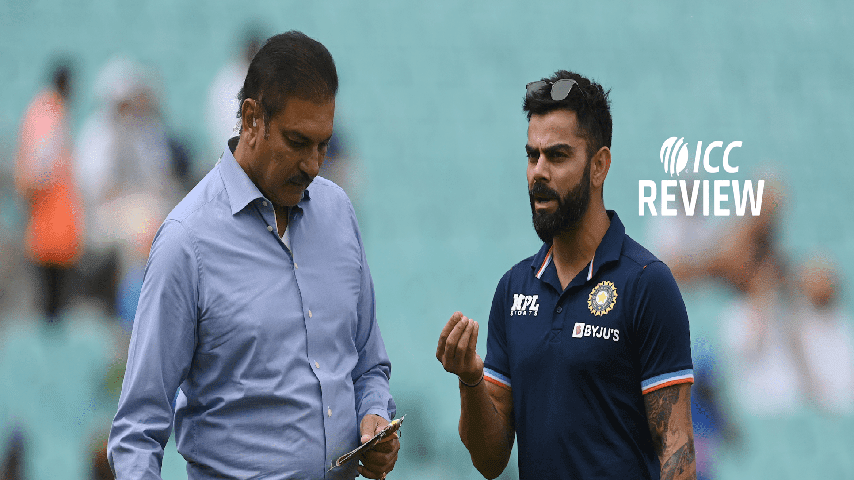- Wed, March 16, 2022

Loading

Loading

Ravi Shastri Opens Up on Virat Kohli’s Test Retirement: “His Mind Had Told His Body It Was Time”
15 May 2025 – Cricket World Reaction: In a heartfelt and candid revelation, former India head coach Ravi Shastri has opened up on his private conversation with Virat Kohli just days before the star batter announced his shock retirement from Test cricket. The news, which stunned the cricketing world earlier this week, marked the end of an era that redefined India's red-ball ambitions.
Speaking on The ICC Review with presenter Sanjana Ganesan, Shastri confirmed that Kohli reached out to him roughly a week before the official announcement and spoke with absolute clarity about his decision. Kohli, who amassed 9,230 Test runs, including 30 centuries, walks away as one of India’s most decorated Test players, and without doubt, its most fiery ambassador in the modern era.
Shastri on Kohli’s Clarity: “There Were No Doubts in His Mind”
During his conversation with Ganesan, Shastri recounted that Kohli's voice carried conviction something he could immediately sense was not up for debate. “He said he had given it all,” Shastri recalled, “and there were no regrets.”
For Shastri, who witnessed Kohli’s evolution from a rising star to India’s most successful Test captain, the news was still jarring. “He surprised me,” admitted the former coach. “I thought he had two or three more years of red-ball cricket in him. But sometimes, when your mind is cooked, it tells your body: it’s over.”
Kohli’s shock announcement came just weeks ahead of India’s crucial five-Test tour of England in June, a series many expected him to lead from the front. But as Shastri explained, the intensity with which Kohli lived every game made a long career even more mentally taxing.
The Burnout Factor: “His Involvement Was Like No Other”
Few players in world cricket have worn their heart on their sleeve as relentlessly as Virat Kohli. Whether fielding at slip or diving at mid-off, Kohli’s physicality was always matched by his emotional investment. For Shastri, that commitment came at a cost.
“If he decided to do something, he gave it 100%,” he said. “When others might’ve sat back after their own job was done, Virat wanted to be everywhere taking the catches, making the calls, rallying the bowlers. That level of intensity always leads to burnout if not managed properly.”
The notion of burnout isn’t new in elite sport, but Kohli’s persona one that fed off high voltage cricket and inspired similar energy in teammates meant that a toll was always inevitable. Add to that the relentless spotlight that came with being India’s most visible cricketer, and Shastri believes the retirement was both personal and logical.
Kohli's Stardom: “Infectious, Unmatched, and Occasionally Polarizing”
Kohli’s influence went well beyond numbers and records. His every move was dissected whether it was a celebration, an argument with opposition players, or a half-century in difficult conditions. He was as polarizing as he was inspiring, and Shastri acknowledges that duality.
“He had the ability to get under the skin not just of players, but of viewers too,” Shastri smiled. “His passion spread like wildfire. Some loved it, some hated it, but you couldn’t ignore it.”
Kohli’s “love-hate” persona became an integral part of cricket’s broader cultural discourse. He transformed the Indian Test side into a fast-bowling unit that hunted for wins in foreign conditions a trait that defined the Shastri-Kohli era.
Legacy Cemented: Records, Achievements, and a Cultural Shift
Kohli retires as India’s most successful Test captain, with 40 wins from 68 matches a feat that outpaces even MS Dhoni’s 27 victories. Under Kohli’s leadership, India became a world-beating side in Australia, England, South Africa, and the West Indies. A historic series win Down Under in 2018–19 was perhaps the crowning jewel of his captaincy career.
Shastri believes Kohli’s contribution goes beyond just silverware or stats. “He changed the attitude of Indian cricket in Tests,” he said. “Fitness became non-negotiable, aggression became a virtue, and fear of overseas tours was wiped out.”
This mental shift in Indian cricket, Shastri argues, is part of Kohli’s lasting legacy. Players like Jasprit Bumrah, Mohammed Shami, and Ravindra Jadeja thrived under his belief in impact-driven red-ball cricket.
No Regrets, No Leftovers: A Career Complete
As cricket fans and analysts debate the timing of Kohli’s exit, Shastri is confident the decision comes from a place of completion, not resignation. “He’s done everything won a U-19 World Cup, led India across formats, achieved what many dream of,” he said.
When asked if Kohli might regret walking away too soon, Shastri was certain: “There will be no what-ifs. He played with his heart, and that heart now tells him to stop. That’s reason enough.”
For Indian cricket, it’s the end of an era. For Kohli, it’s a quiet full stop at the end of a roaring chapter.
Comments:
Leave a Reply